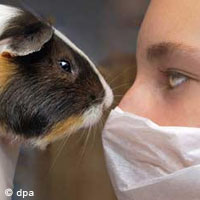Consultations reveal diverging views on laboratory animal welfare
The general public is broadly in favour of policies to improve the welfare of laboratory animals, while many scientific experts are more cautious, wishing to ensure welfare without increasing the administrative burden. These views are highlighted in the responses to a public and expert consultation, published by the European Commission. The consultations ran from June until August, and were part of the Commission's preparation for a proposal to revise Directive 86/609/EEC on the protection of animals used for experimental and other scientific purposes. The public consultation received 42,655 replies from citizens of all 25 EU Member States, while the expert consultation resulted in 283 replies, providing some 12,000 detailed comments. While the results of the public consultation cannot be considered as representative of the views of society at large, as only those interested in the subject took part, they give a clear indication of a wish to see the welfare of laboratory animals improved. The number of replies - the third highest in the history of Commission online consultations - also point to strong public interest in this area. Some 93% of respondents answered the question 'do you believe that more needs to be done to improve the level of welfare/protection of animals used?' with 'yes, certainly' or 'yes, probably'. Over three quarters thought that not enough EU money is invested in developing and validating alternative testing methods, and 92% thought that the EU should have a leadership role in promoting awareness of animal protection. The Eurogroup for Animals has welcomed the results of the consultation, saying that next year's negotiations on the Directive's revision will need to take into account the strong feelings of EU citizens. 'We all want animal experimentation to come to an end but this will not happen tomorrow,' said Eurogroup director Sonja Van Tichelen. 'Meanwhile it is our priority to reduce numbers as much as possible and for that reason legislation must be tightened.' Experts too indicated their support for ensuring animal welfare, although many were reluctant to endorse scenarios that would involve more regulation. Many objected to extending current provisions to animals for tissue, organs, foetal or embryonic forms should be subject, and a large number also argued against modifications to include animals used for basic research. 'I do not see a welfare benefit for this extension of the act,' wrote one expert. 'It will simply increase the bureaucratic burden on European companies, and force more work out of the European area, into less and unregulated parts of the world.' Others argued that animals used for basic research or for their tissue are not treated differently to any other animal used for research, and do not therefore require specific provisions. Some respondents did express a wish to see animals used in basic research covered by the Directive, arguing that it would improve public confidence and accountability. However, administrative costs would be high in the countries introducing such regulations for the first time, thought several scientists. Asked about the authorisation of projects, experts again emphasised the need to avoid adding to current administrative obligations. Respondents also underlined the need to avoid duplication, saying that project authorisation and ethical review often overlap. Scientific experts also responded to questions on ethical review, housing and care standards, transparency, non-human primates, inspections, education and training, avoiding duplication of experiments, use of CO2 for euthanasia and statistical reporting. The Commission's preliminary analysis found that while there was broad agreement in most areas, opinions were diverse on issues such as the potential impact of revising the Directive, the links between animal welfare and violent extremist activity, the prohibition on using CO2, and impact calculations for second generation, purpose-bred non-human primates.



